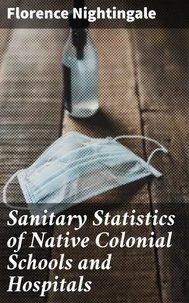Sanitary Statistics of Native Colonial Schools and Hospitals
Par :Formats :
Disponible dans votre compte client Decitre ou Furet du Nord dès validation de votre commande. Le format ePub est :
- Compatible avec une lecture sur My Vivlio (smartphone, tablette, ordinateur)
- Compatible avec une lecture sur liseuses Vivlio
- Pour les liseuses autres que Vivlio, vous devez utiliser le logiciel Adobe Digital Edition. Non compatible avec la lecture sur les liseuses Kindle, Remarkable et Sony
 , qui est-ce ?
, qui est-ce ?Notre partenaire de plateforme de lecture numérique où vous retrouverez l'ensemble de vos ebooks gratuitement
Pour en savoir plus sur nos ebooks, consultez notre aide en ligne ici
- Nombre de pages81
- FormatePub
- ISBN859-65--4705743-7
- EAN8596547057437
- Date de parution13/06/2022
- Protection num.Digital Watermarking
- Taille506 Ko
- Infos supplémentairesepub
- ÉditeurDIGICAT
Résumé
In her pioneering work, "Sanitary Statistics of Native Colonial Schools and Hospitals, " Florence Nightingale employs a meticulous analytical style to illuminate the dire conditions prevalent in medical and educational institutions under British colonial rule. Nightingale skillfully combines empirical data with sociocultural observations, offering a profound critique of the hygienic neglect faced by native populations.
This work situates itself within the broader Victorian discourse on health and social reform, highlighting the intersection of public health and colonial policy, while also advocating for sanitation as a moral imperative and a crucial component of healthcare administration. Florence Nightingale, renowned as the founder of modern nursing, was profoundly influenced by her experiences during the Crimean War, where her observations of unsanitary hospital conditions ignited her commitment to health reform.
Her background in statistics and her relentless advocacy for improved sanitary practices fueled her research in the colonies, aiming to raise awareness and drive change in public health policies. Nightingale's dedication to social justice and her innovative approach to health metrics set the foundation for future health reforms. This essential reading is recommended for scholars, healthcare professionals, and anyone interested in public health, colonial studies, or the history of nursing.
Nightingale's work invites readers to engage critically with the historical context and implications of sanitary conditions, making it a vital resource for understanding the complexities of health reform in a colonial framework.
This work situates itself within the broader Victorian discourse on health and social reform, highlighting the intersection of public health and colonial policy, while also advocating for sanitation as a moral imperative and a crucial component of healthcare administration. Florence Nightingale, renowned as the founder of modern nursing, was profoundly influenced by her experiences during the Crimean War, where her observations of unsanitary hospital conditions ignited her commitment to health reform.
Her background in statistics and her relentless advocacy for improved sanitary practices fueled her research in the colonies, aiming to raise awareness and drive change in public health policies. Nightingale's dedication to social justice and her innovative approach to health metrics set the foundation for future health reforms. This essential reading is recommended for scholars, healthcare professionals, and anyone interested in public health, colonial studies, or the history of nursing.
Nightingale's work invites readers to engage critically with the historical context and implications of sanitary conditions, making it a vital resource for understanding the complexities of health reform in a colonial framework.
In her pioneering work, "Sanitary Statistics of Native Colonial Schools and Hospitals, " Florence Nightingale employs a meticulous analytical style to illuminate the dire conditions prevalent in medical and educational institutions under British colonial rule. Nightingale skillfully combines empirical data with sociocultural observations, offering a profound critique of the hygienic neglect faced by native populations.
This work situates itself within the broader Victorian discourse on health and social reform, highlighting the intersection of public health and colonial policy, while also advocating for sanitation as a moral imperative and a crucial component of healthcare administration. Florence Nightingale, renowned as the founder of modern nursing, was profoundly influenced by her experiences during the Crimean War, where her observations of unsanitary hospital conditions ignited her commitment to health reform.
Her background in statistics and her relentless advocacy for improved sanitary practices fueled her research in the colonies, aiming to raise awareness and drive change in public health policies. Nightingale's dedication to social justice and her innovative approach to health metrics set the foundation for future health reforms. This essential reading is recommended for scholars, healthcare professionals, and anyone interested in public health, colonial studies, or the history of nursing.
Nightingale's work invites readers to engage critically with the historical context and implications of sanitary conditions, making it a vital resource for understanding the complexities of health reform in a colonial framework.
This work situates itself within the broader Victorian discourse on health and social reform, highlighting the intersection of public health and colonial policy, while also advocating for sanitation as a moral imperative and a crucial component of healthcare administration. Florence Nightingale, renowned as the founder of modern nursing, was profoundly influenced by her experiences during the Crimean War, where her observations of unsanitary hospital conditions ignited her commitment to health reform.
Her background in statistics and her relentless advocacy for improved sanitary practices fueled her research in the colonies, aiming to raise awareness and drive change in public health policies. Nightingale's dedication to social justice and her innovative approach to health metrics set the foundation for future health reforms. This essential reading is recommended for scholars, healthcare professionals, and anyone interested in public health, colonial studies, or the history of nursing.
Nightingale's work invites readers to engage critically with the historical context and implications of sanitary conditions, making it a vital resource for understanding the complexities of health reform in a colonial framework.









